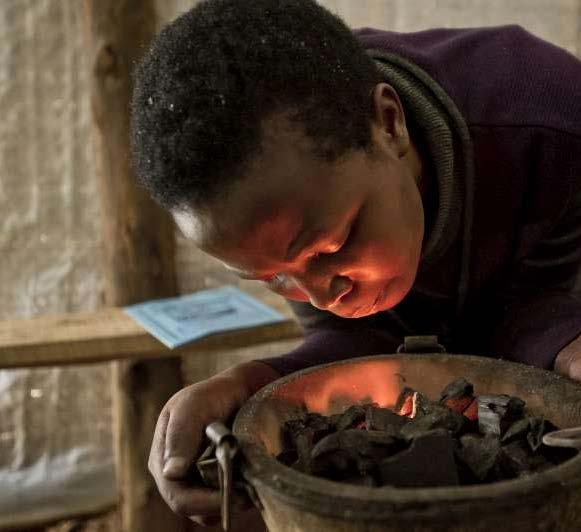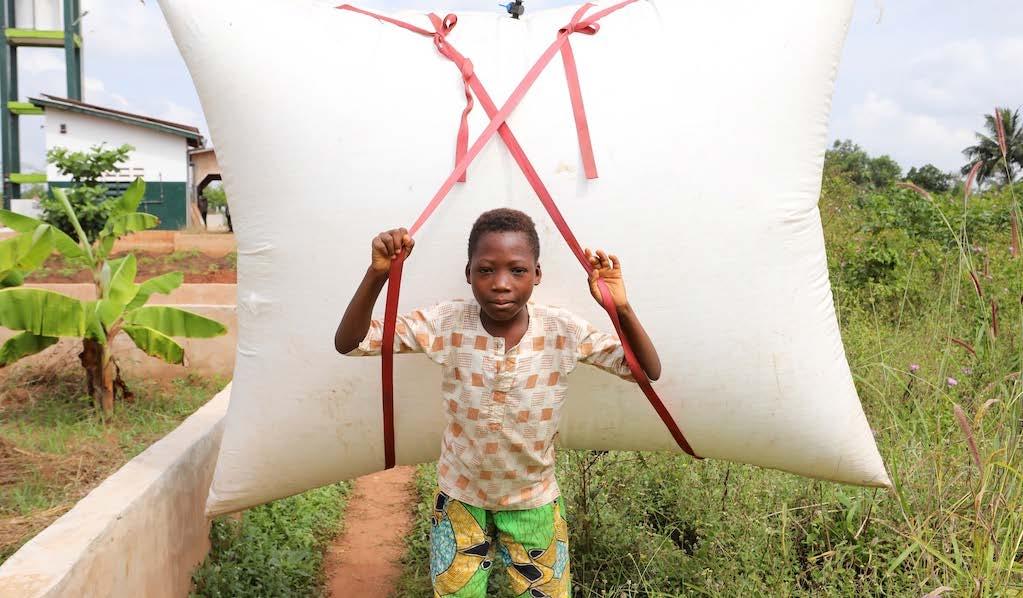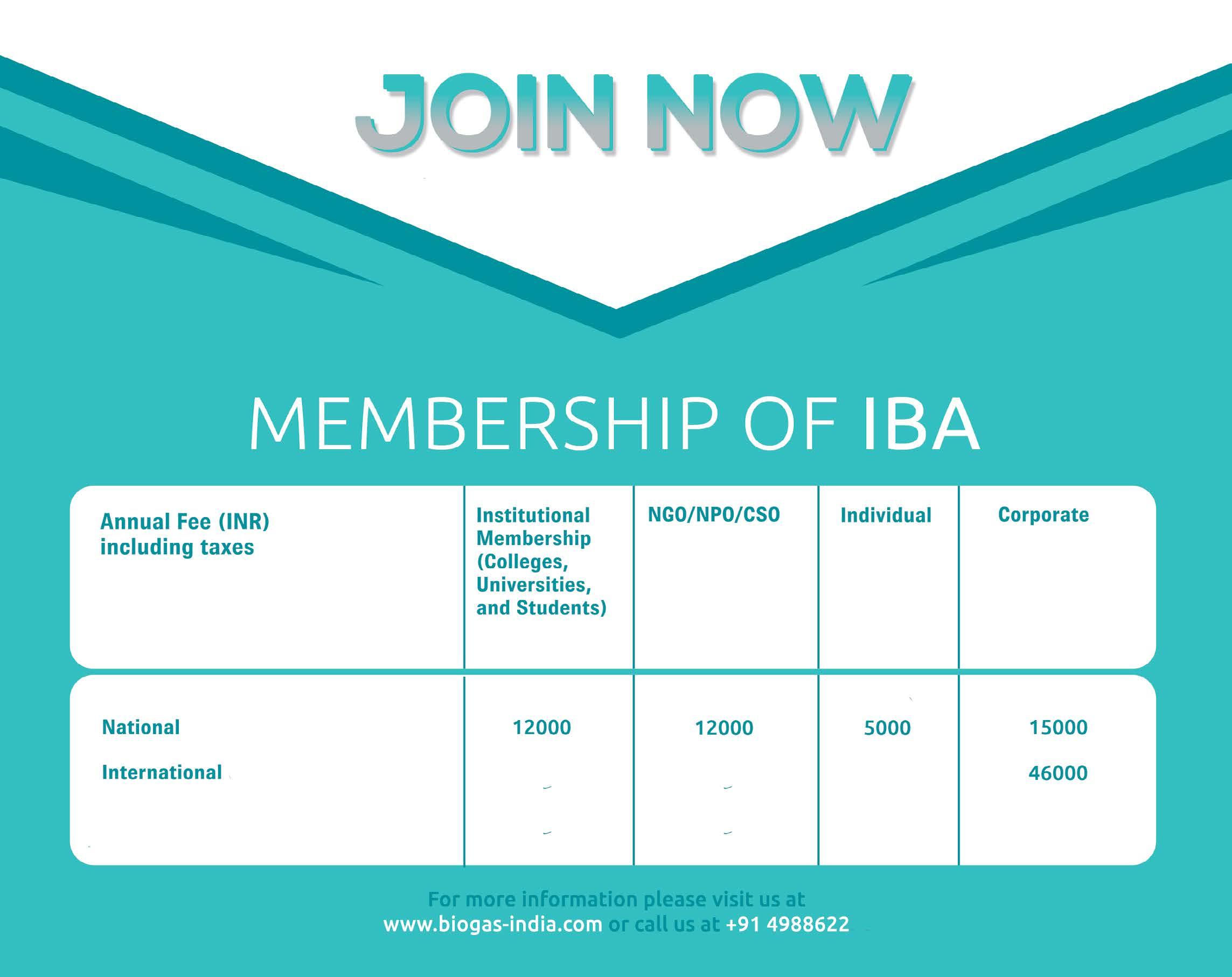
6 minute read
Biogas as social business for local partners–aid free
Picture: Lighting a charcoal fire for cooking, Rwanda. ©(B)energy
Aset of a small biogas digester, biogas backpacks and biogas stoves replaces firewood for cooking in developing countries. Not only the technology, but rather the approach of (B)energy proves that a smart business model implemented by local entrepreneurs is much more effective than aid projects funded by western donors.
Cooking in Africa is expensive! It is not the food, but the energy used for cooking that has become a major expense for African households south of the Sahara. While still about 80 percent of the households in Sub-Saharan Africa cook with traditional fuels, thus fire wood or charcoal on more or less open fires, this practice consumes up to half of the households’ incomes. These fuels significantly contribute to greenhouse gas emissions, deforestation, soil erosion, loss of soil fertility and lead to severe indoor air pollution with premature death of about 4 million people world wide – annually.
Biogas is probably the cleanest and most sustainable alternative cooking fuel that could be used, but its acceptance and dissemination is progressing only very slowly in Africa. But why?
One strategy that has been pursued in several countries is to distribute free or subsidized bio
Picture: Subsidized biogas system in Nepal. Girl posing on the roof of a concrete underground dome biogas digester with dung cakes being dried for cooking instead of using it to produce biogas ©=(B)energy

gas systems among the population. In Ethiopia alone, over 25.000 household biogas plants have been built in the past 10 years with over 80 million Euros from European tax payers. A program that originally had one major aim: private sector development. Until today the private sector has not been able to develop alongside the program. No company, including (B)energy, has been able to compete with the heavily subsidized biogas digesters promoted by the program. Consequently, biogas technology is not freely available on the market, but only for households that qualify for the subsidy. Alternative approaches in the biogas sector in other countries are directly run by aid organizations, who give biogas systems away for free on a project to project basis. The few companies that exist in the sector use every chance to take donations or external funding to extend and survive their “businesses”. The consequence of this: there is literally no biogas system on the market that is not somehow subsidized. The amount of subsidy determines the price for the user and the success of the competitors is thus determined by the most successful fund raiser. At the end the market is so heavily distorted, that nobody will be able to exist in the longterm – at the cost of the local population.
When aid organizations or aid money gets involved in biogas dissemination, then the whole biogas sector is put at risk in 3 major ways: 1. The reputation of biogas technology is damaged. We often meet people who know biogas as something that is “very expensive and does not work”, because of lack or ownership for free products 2. It reduces the willingness of customers to pay for a biogas system and increases jealousy – if some people get a free or subsidized system, everybody else expects the same or feels treated unfair 3. Private sector development is not possible when entrepreneurs have to compete with aid-supported products or companies. But companies would pay tax, which forms the basis for development
Become a biogas entrepreneur – independent and aid free: More and more stakeholders start to realize these negative effects of foreign intervention. All part
ners of (B)energy work on setting a tangible example of how it could be done differently. By following a fundamentally different approach where the social business rules of Muhammaed Yunus are taken very seriously and especially the rule of “economic and financial independence” are implemented strictly: 100% exclusion of western funding, this means no aid money, no donations, no investment incentives. This leads to mainly local (African) investments that are not interfered by aid organisations, who sell the same product. The aim is to protect the market and those people, who take responsibility in their own countries for their people and a better life for them. To get started is easy: interested business partners participate in a biogas business training where they learn everything about biogas science and technology, practical installation and maintenance and the business frame that is provided. It includes technical solutions as well as software solutions, legal advise, technical support, import/ export support, innovations and licenses, network access and many more. Once the new importer has started to make the biogas system available on the market in her/his country, independent installers can join. Installers are usually young, active, practical people from all parts of the country, especially from rural areas, who use the chance to build their own biogas installer business. Through an online training, the (B)app installers get trained and guided in setting up their own installer venture. They are also the ones who promote the technology in their surrounding. Their customers, this means the end customers of the biogas systems themselves become entrepreneurs. While producing biogas form organic waste and animal manure they are introduced to the idea of selling biogas in the biogas backpack. Biogas serves as a substitute for fire wood and charcoal and a combination of the biogas backpack with the modular biogas burner, neighboring households can quite comfortably switch their cooking fuel.
However, the practices of market distortion persist and one of the most important services (B) energy tries to provide to their partners is the protection from market distortion. This is done in different ways, for example by examining organization, that want to buy biogas technology of (B)energy. If Western money is involved, the organization has to fill-in a matrix that makes mar

Picture: (B)energy installer setting up a system in Rwanda ©(B)energy
ket distortion visible. They will then be advised towards a not damaging approach and a special agreement is signed. Additionally, (B)energy tries to convince organizations, who plan biogas projects, of a more careful approach. One example is the currently planed biogas project in Northern Uganda, where a big European Aid Organization plans to give away 200 biogas systems for free. “Beneficiaries” only have to contribute material, space and work time. As you can imagine, this destroys the livelihood of any existing or future biogas entrepreneur in the region or even in the
Katrin Pütz
Managing Director
(B)energy GmbH

whole country. It is one significant task to protect business partners from this thread, warn them in advance or try to influence organizations to stop or change their projects.
Social entrepreneurship can lead the way to a sustainable energy and biogas market. This ap
Picture: Biogas user picks up biogas at a central refill station in Benin, Toffo © ReBin
proach has the potential to change not only the cooking reality of many, but also to create an example of a sector, that recognizes its responsibility and its possible impact. Having a code of ethics would be a desirable vision!




